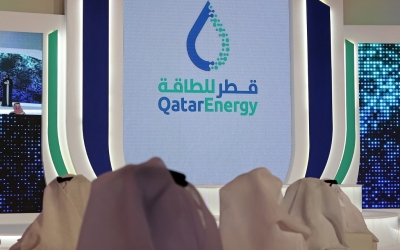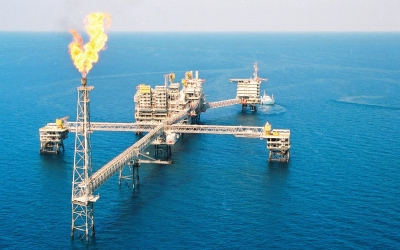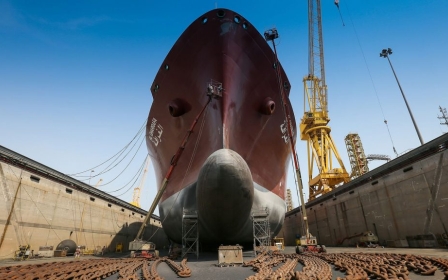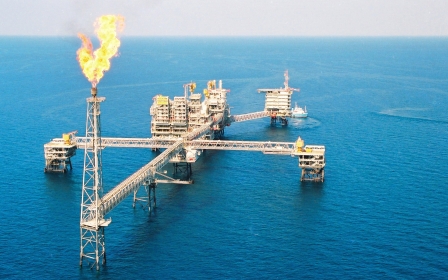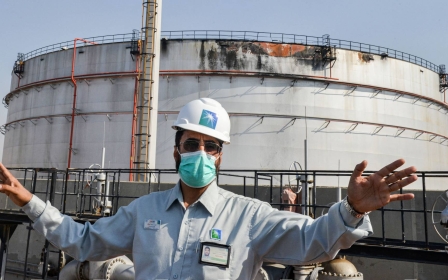Qatar gas shipments to Germany will actually come from Texas
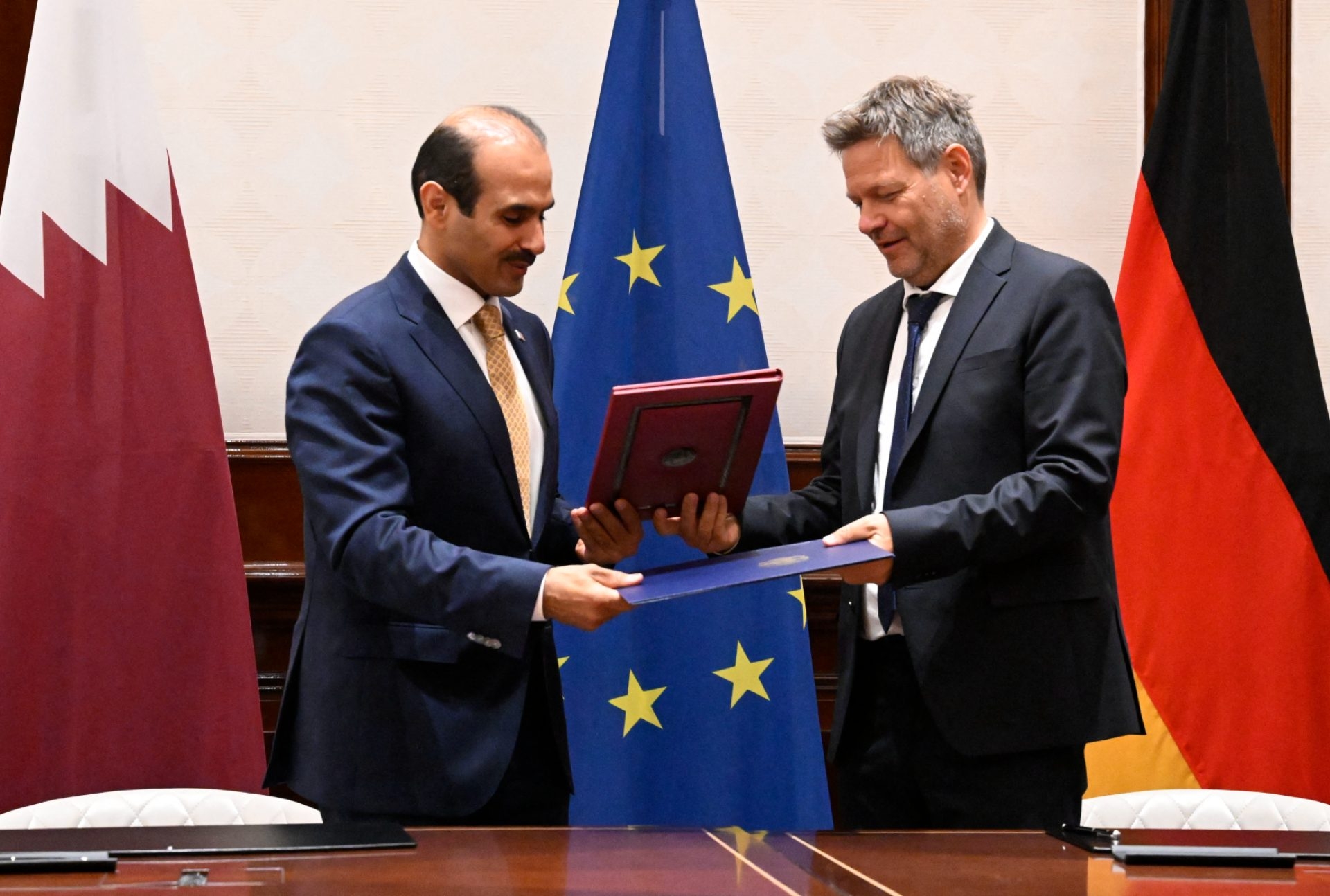
Germany and Qatar signed a deal last week to deepen their energy partnership focusing on the supply and processing of liquified natural gas (LNG).
LNG is Qatar's main export and is desperately needed in Germany as it seeks alternatives to its current energy dependency on Russian natural gas.
Berlin is under pressure to introduce an energy embargo in response to Russia's invasion of Ukraine.
'Qatar produces around 107 billion cbm of gas annually, and 80 percent of that is locked in long-term contracts. Only 10-15 percent can be diverted to Europe'
- Thomas O'Donnell, energy analyst
It also faces the prospect that Moscow could cut off gas supplies unilaterally - as it has already to Poland, Bulgaria and Finland - in retaliation for Germany's diplomatic support and military aid to Ukraine.
But industry experts told MEE that the deal is mired with caveats on the German side.
New MEE newsletter: Jerusalem Dispatch
Sign up to get the latest insights and analysis on Israel-Palestine, alongside Turkey Unpacked and other MEE newsletters
Thomas O'Donnell, an energy and geopolitical analyst based in Berlin, said the German government is losing political ground due to rising energy costs. He suggested that the deal with Qatar amounts to a short-term gimmick intended to shore up support.
Germany "failed to fill their gas storage before the winter last year, and that led to nearly a 30 percent hike in energy costs for the domestic consumer. If they fail again there might be calls for the government to go," said O'Donnell.
"Around 56 percent of Germany's gas consumption comes from Russia. That's billions of cubic metres of gas through dedicated pipelines, NordStream1 and TurkStream. It would take a monumental effort to shift that heavy a dependency to another supplier."
According to O'Donnell, in 2021 Germany used around 71 billion cubic metres (cbm) of gas from Russian energy giant Gazprom. Replacing such large volumes with Qatari gas is simply not possible.
"Qatar produces around 107 billion cbm of gas annually, and 80 percent of that is locked in long-term contracts. Only 10-15 percent can be diverted to Europe. The numbers don't add up," he said.
O'Donnell said that European countries' desperation means that they are paying a heavy price for spot gas, that is large deliveries of gas purchased in one-off transactions.
These transactions are often made on an emergency basis when the buyer has to pay a much higher rate than when purchasing through long-term contracts.
The current price of spot gas is up 176 percent from last year.
"The US has the most spot gas available in the market, and much of it is being bought by Europe at very high rates," said O'Donnell.
Fracking concerns
Another complicated aspect of the deal is where the gas comes from and how it is extracted from the ground.
Qatar is expanding its LNG facilities with the aim of increasing production by 2026. Before then, it has pledged to deliver gas to Germany sourced from its LNG projects in the US.
"Whatever we can provide for energy security in Europe, even during this period, we will make sure that we can provide," Qatar's emir, Sheikh Tamim bin Hamad Al Thani, told reporters at a press conference in Berlin.
Qatar's foreign minister, Sheikh Mohammed bin Abdulrahman Al Thani, told German media that the Golden Pass gas liquification plant being developed on Texas' Gulf Coast would be ready to begin delivery to Germany in 2024.
Golden Pass, one of the largest LNG terminals in the world, was built to dock shipments of LNG when the US was a net importer of gas. With the US now among the world's largest producers of LNG, the site is being adapted as an export facility.
Golden Pass is a joint venture between QatarEnergy and ExxonMobil with QatarEnergy holding a 70 percent stake.
O'Donnell said the boom in US gas exports had been fuelled by the increased use of fracking to extract previously inaccessible shale gas.
According to a US Department of Energy report published in 2021, 75 percent of natural gas produced in the US in 2019 was obtained by fracking.
Fracking, or hydraulic fracturing, is a controversial process of acquiring oil and gas by widening cracks in, and under, the Earth's surface by injecting water, chemicals, and sand at high pressure, which helps extract gas and oil tightly trapped in hard shale rocks.
The process is highly controversial because environmental campaigners say it can cause earthquakes, poison groundwater, damage landscapes and threaten wildlife.
In 2020, researchers ar Harvard University linked fracking wells in US oil and gas fields to increased levels of methane, a greenhouse gas that contributes to global warming, leaking into the atmosphere.
MEE contacted Golden Pass to clarify whether LNG exports to Germany would include gas obtained by fracking but had not received a response at the time of publication.
Fracking ban
Germany has banned gas exploration through fracking.
Last month, the country's economy and climate minister, Robert Habeck, whose Green Party is part of the governing coalition, told a newspaper that fracking was not an option to access large shale gas reserves in the north of the country, as the country aims to be carbon neutral by 2045.
Yet Habeck was the minister who signed the energy deal with Qatar - which will see gas extracted by fracking imported into Germany - in a ceremony in Berlin last Friday.
'We are concerned that all this gas that is coming in is from fracking, and the dangers that poses to the environment'
- Sascha Muller-Kraenner, climate campaigner
The issue could expose differences of opinion in Germany's ruling coalition, within which the neoliberal Free Democratic Party has long called for fracking to be allowed to achieve energy security and reduce reliance on dirtier fossil fuels.
Climate activists in Germany have been campaigning against any new long-term gas deals which would take the country further from its existing climate goals which focus on a shift to renewable energy sources.
Sascha Muller-Kraenner, managing director of climate NGO, Deutsche UmweltHilfe, told MEE he is deeply concerned about the amount of gas and the longevity of the contracts that Germany is signing.
"We are concerned that all this gas that is coming in is from fracking, and the dangers that poses to the environment," he said.
"We do understand the emergency where we need to move away from Russian gas dependency. But we are also concerned about how much gas we are buying from Qatar, because we would like the German government to stick to its climate goals."
Fraught deal
Politically, the deal is fraught with complications, said O'Donnell.
"The Qatari emir came here to discuss the longevity of the contract. Why would Qatar want to move away from its other long-term contractual obligations to help Germany and the EU?
"Germany just wants a 10-year deal, but that's not good enough for Qatar, which was eager to set up a re-gasification plant to turn LNG back into natural gas."
Re-gasification is the process of converting liquified gas back to a gaseous state. Transporting natural gas in liquid form is more economical as its volume is reduced 600 times. Once the LNG has arrived at its destination, a re-gasification plant would often use heated sea water to change LNG back into gas.
Germany, however, does not have any LNG re-gasification plants. According to O'Donnell, Qatar was interested in developing those facilities in German ports but backed away because of the shorter length of contracts proposed by Germany.
Instead, Germany is investing in four floating re-gasification and storage units.
"The Germans are reluctant to sign a 20-year deal because they have their own renewable goals, which will see them move away from fossil fuels. So for them this is a stopgap measure," said O'Donnell.
Middle East Eye delivers independent and unrivalled coverage and analysis of the Middle East, North Africa and beyond. To learn more about republishing this content and the associated fees, please fill out this form. More about MEE can be found here.


